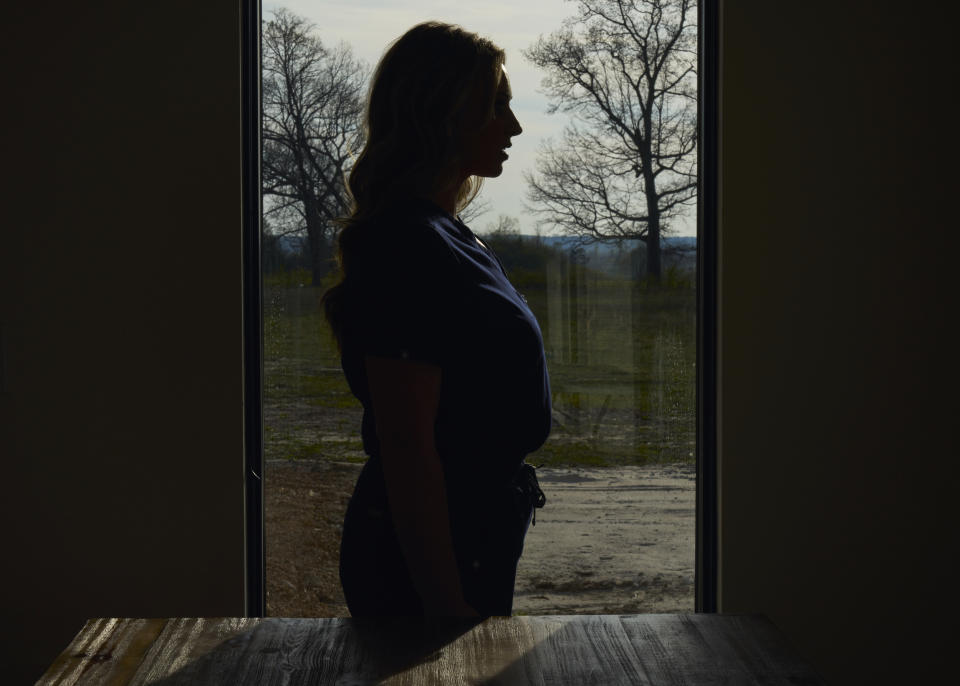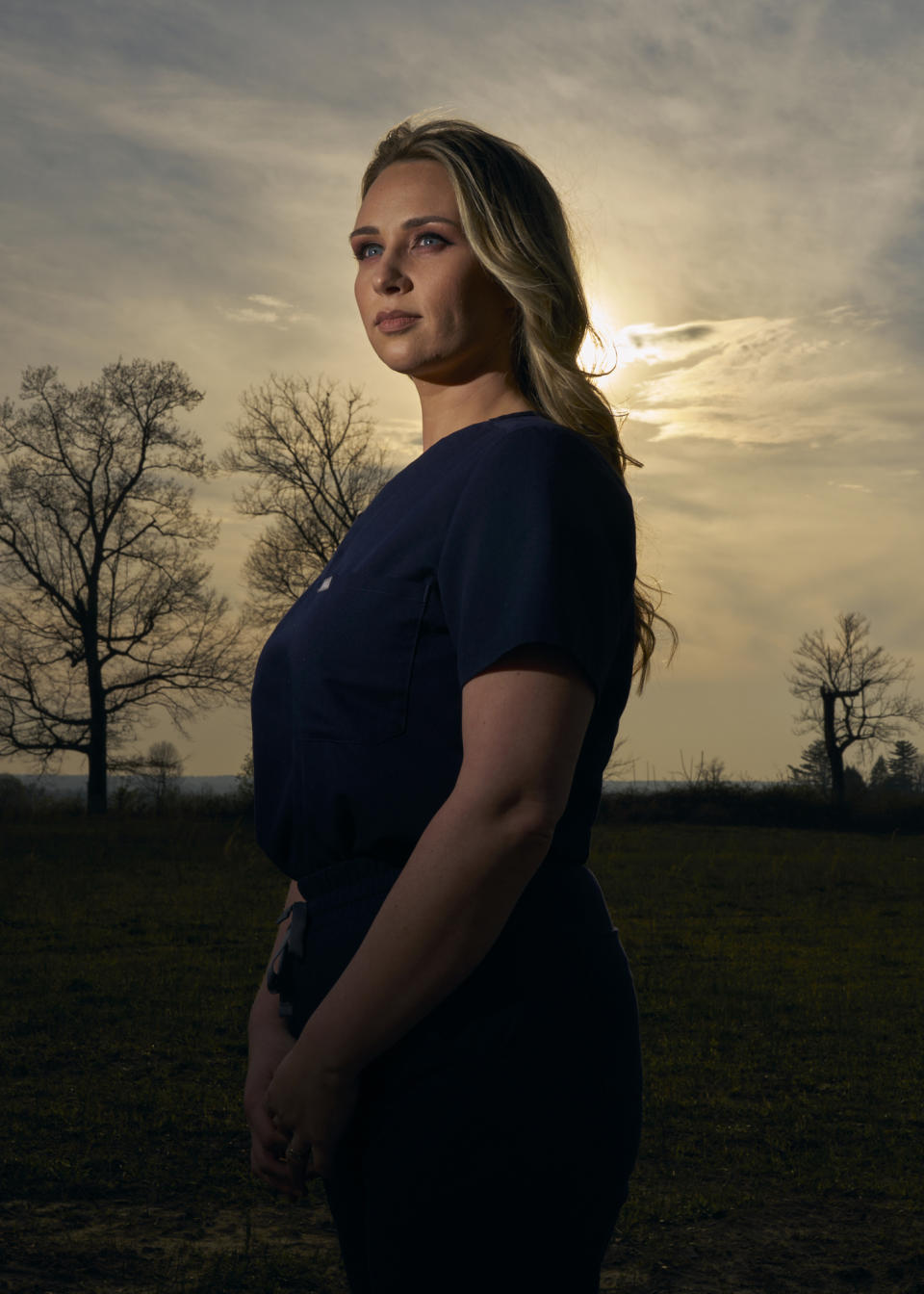She became an anti-vaccine icon, and vanished. She’s finally ready to talk about it.
HIGDON, Ala. — Tiffany Dover is alive. Sitting across from Tiffany at her kitchen table, this is obvious. She breathes in and out. She gestures with her hands. She laughs generously. Dimples carve into both cheeks when she smiles, which she does a lot. Her eyes are wide and bright and terribly blue.
“I didn’t die that day,” Tiffany tells me. “But the life I knew did.”
I’d been following Tiffany since that day, Dec. 17, 2020. Like thousands of others, I first saw her on a livestream during the national rollout of Covid vaccines to front-line workers, where Tiffany became one of the first people in the U.S. to get a shot. I was also watching when she fainted immediately after, launching a wave of misinformation and conspiracy theories that would eventually unravel her life.
The modern anti-vaccine movement was powered by unverified stories of the dead and damaged. Tiffany wasn’t the first person to be swallowed up in an anti-vaccine propaganda campaign, and she wouldn’t be the last.
The unsettling thing about it — to me and the more well-meaning conspiracy theorists who took up an interest in Tiffany’s case — was that she seemed to just disappear.
I called and sent emails, but Tiffany never got back to me. Her employer declined media interviews on her behalf, and she stopped posting on her own social media accounts. I made several visits to her Alabama home and to CHI Memorial Hospital Chattanooga. But I never spoke to her.
So all I could do was watch, as Tiffany became the worst kind of internet celebrity, as she trended on every social media platform, as fact-checkers around the world worked to dispel reports of her death, and as the theories about her evolved, spun up by a phenomenon researchers call participatory misinformation. On Instagram, users flooded posts of her children with demands that she speak. People hounded her husband on Facebook and branched out to the social media pages of extended family members, colleagues and acquaintances, urging them to come clean about what had happened to Tiffany and the cover-up afterward. They made websites. They led Facebook groups. They recorded songs. They came to her house. Everyone wanted to know what happened to Tiffany.

I reported what I could about Tiffany and how the anti-vaccine community had used her story in a podcast last year. Her silence spoke for itself. It seemed like Tiffany had made up her mind. So I was surprised when she texted me in February. Tiffany said she was ready to talk about everything that had happened to her and offered to make a video answering any questions I had. I asked her for one better: Let me come back out to Alabama.
Tiffany reluctantly accepted. Sitting across from her, Tiffany felt like the person I had seen in hundreds of her social media posts: bubbly and warm, a doting wife and mother, a dedicated nurse. But she felt delicate, too. No wonder, given what she’s been through.
“I was in a dark place and I did not have it in me to do this, because I didn’t know if I could trust you,” Tiffany tells me as I’m across from her, face to face. “I don’t know why I trust you now, but I’m choosing to.”
Tiffany Dover is alive, but she’s never addressed the rumors. She never put out a statement or made a video about what she went through, and she regrets it. She thinks she should have continued to post on social media and act as if everything was normal — because it was.
“That would’ve been a perfect moment for us to speak out,” she says. “Yes, I did pass out. This could be a side effect. You can pass out from receiving a vaccine, but that’s OK because it can also save your life. So it’s worth it.”
“The silence is what flamed this.”

Tiffany’s drawl gives away that she’s lived her whole life in the same place: the small towns dotting the borders where Georgia, Tennessee and Alabama meet. She and her husband, Dustin, fell in love when they were young teenagers and had two kids.
Tiffany went to college while she raised her babies, later graduating and taking a job at CHI Memorial Hospital Chattanooga. She’d started as a nurse caring for non-critical-care cardiac patients, but she found her calling on the intensive care unit and emergency teams.
In her personal life, Tiffany thought of herself as timid and sheltered. But to her own surprise, she thrived at work in the most chaotic situations — the moments where a wasted second or a single mistake could mean the difference between life and death. She felt calm in that chaos. And in 2020, after nearly 10 years at CHI Memorial, her boss announced that she was leaving and that Tiffany would be promoted to interim manager.
Before she could get comfortable in her new role, the pandemic hit. And Tiffany’s unit, which had previously served cardiac patients, had a new mandate. It would be the Covid ward.
The work was grueling. Along with their regular nursing duties, patients needed to be proned, or flipped, multiple times a day just to breathe. Since visitors still weren’t allowed, the nurses held up iPads so families could say goodbye. The unit was always full, and their patients were always so sick.
“There were times when it felt hopeless,” Tiffany says. “Almost like we were a palliative care unit. Death after death, after death.”
December 2020 had been the deadliest month of the pandemic, and Tiffany’s unit was exceptionally busy on the day that Covid vaccines came to CHI Memorial. Tiffany was elated to receive hers, more so because of what it meant: Soon everyone would have access to vaccines and the constant death would stop.
She hadn’t had a minute for lunch, so when it was time to get her vaccination, Tiffany grabbed a piece of sushi from a co-worker and headed down to the staging area, where news cameras were waiting to capture the occasion.
In a video that continues to circulate the internet, Tiffany sits at one of three vaccination stations. Her dark brown hair is parted to the left, her hands are folded neatly in her lap. Someone in a white coat gives her the shot in her left arm and Tiffany claps.
Minutes later, Tiffany was asked to speak in front of the assembled cameras. Tiffany didn’t know that the news stations were livestreaming the footage on Facebook, but she was happy to talk on camera. As Tiffany stood and spoke, however, a familiar wave washed over her. Her arm began to throb, she got sweaty and dizzy, and all she could do was say, “I’m sorry,” before she fainted into the arms of two nearby doctors.
“I wanted so badly to tell what this vaccine meant to me,” Tiffany says now. “I thought that I could just push through because it was important to me and I thought my body might respect that, but it didn’t care. It did what it does.”
Tiffany came to, and she was almost immediately interviewed by Chattanooga, Tennessee’s NBC affiliate WRCB on video. She told the reporter that she was prone to fainting, usually when she felt pain, but that she was fine. Then she went back to work.
Back in her unit, she told a co-worker what had happened.
“Yeah, I know,” he said. “I saw it. It was live on Facebook.”
Still, he convinced her she needn’t worry. It was just a local news station. How bad could it be?

Turns out, very. Within 24 hours, Tiffany, or as she was being referred to at the time, “Tennessee nurse,” was trending on every social media platform. That night, she was featured on the conspiracy theory internet show Infowars. New videos about Tiffany were being posted to YouTube every 19 minutes, according to Paola Pascual-Ferrá, an associate professor of communication at Baltimore’s Loyola University Maryland, who was tracking the spread in real time. And Tiffany was going global: Most of the videos and posts about her were coming from outside the U.S., Pascual-Ferrá said.
The posts weren’t just replays of Tiffany’s fall. The conspiracy theories were evolving quickly with what seemed like the whole world contributing to an investigation where the conclusion had already been determined. For the thousands of people posting about Tiffany, she didn’t just faint. She was dead. And a fake death certificate started making the rounds.
Meanwhile, the phone in CHI Memorial’s Covid unit rang off the hook. News outlets and conspiracy theorists alike, they all wanted to talk to Tiffany.
“Imagine being in high-stress situations, emotions are already high, and then the phone never stops ringing?” Tiffany says. “It’s enough to make you crazy.”
Tiffany gained tens of thousands of followers on her personal Facebook and Instagram profiles, and the comments never stopped. She knew she needed to do something. So she opened up the notes app on her phone and wrote out drafts of what she might say in a video responding to the rumors.
But she never made that video. She didn’t respond to the thousands of comments on her social media pages, either. Because, she said, her employer told her not to.
Tiffany says that the day after she fainted she got a call from CHI Memorial’s public relations department. The person on the phone said the hospital had been overwhelmed with the attention. She told Tiffany not to answer any outside calls and under no circumstances should she post to social media. She told Tiffany that the hospital would handle things from here.
In a series of interviews and emails with NBC News from 2020 until this March, CHI Memorial Hospital has repeatedly denied knowledge of any directive asking Tiffany not to speak or post. In reply to detailed emails of Tiffany’s account sent to the hospital and its parent company, CommonSpirit Health, CHI Memorial’s director of public relations, Karen Long, replied with a statement. It read in full, “We have no new information.”
On Monday, Dec. 21, 2020, four days after her faint, CHI Memorial unveiled its plan. The official response was formed through a “collaboration between the marketing team and hospital executives,” Long said in an 2021 interview.
CHI Memorial posted a short video to its Facebook page. In it, Tiffany stands at the foot of a staircase. She’s surrounded by co-workers who are all wearing masks and holding signs with the date and messages like “Nursing Leadership Supports Tiffany!”
An nonexhaustive list of reasons why this video made everything worse: Neither Tiffany, nor anyone else, ever speaks. The whole crew just shifts awkwardly for 21 seconds. They’re all wearing masks. Tiffany forgot her white coat at home, so they put her in someone else’s ill-fitting vest. She had her hair curled by a colleague that morning and parted it in the middle, instead of on the side as it was in the vaccine video. The lighting in this new video was much dimmer than it had been in the room with the news cameras. So Tiffany’s electric blue eyes? You could hardly see them.

“It wasn’t a good look for us,” Tiffany says. “It made people suspicious, because if I’m OK, why am I not just talking? Why are we standing there?”
Far from being the proof of life the hospital had expected it to be, the new video was just fodder for conspiracy theorists who took it as evidence of an expanding theory. Now they were convinced that not only was Tiffany dead, but that the hospital and pharmaceutical companies had replaced her with a body double.
Incidentally, the video also created another victim. Conspiracy theorists looking to identify the fake Tiffany set their aim at Tiffany’s colleague, Amber Honea. Amber and Tiffany had worked together at CHI Memorial for years. They were good friends, and besides looking quite a bit alike, they had a lot in common — so much, in fact, that one doctor jokingly called them by each other’s names.
Conspiracy theorists found Amber among Tiffany’s friends and in her photos and decided that she must be the body double. They made videos about Amber and sent her messages.
Amber said they accused her of “participating in the biggest cover-up in history.” They called her a traitor to her country, to her profession and to her friend. They invoked her son. They harassed members of her extended family. They threatened to show up at her house.
“It was very scary and frustrating,” Amber said. “Tiffany and I had lots of conversations about, what do we do? Where do we go from here? How do we approach this? Do we need a lawyer?”
Amber, who left CHI Memorial in 2021, said administrators recommended that she not say anything publicly, but offered little additional help. Amber said her employer suggested she file a police report over the threats, but she never did because she felt like the threats were “just a lot of talk,” and she didn’t have evidence of a crime.
Of the hospital’s response, Amber said, “It was not very supportive.”

Conspiracy theories were once built almost exclusively around public figures: presidents and popes and the powerful “elite.” While this genre of conspiracy theory still exists, another has emerged out of the internet age: the kind that ropes in ordinary people, making them main characters in dreamed-up nefarious plots.
Rank-and-file election workers in Fulton County, Georgia, have been turned into culprits in a conspiracy to steal an election away from Donald Trump. A senseless killing in a robbery gone wrong in Washington, D.C., was spun up into an assassination, ordered by Hillary Clinton. And grieving parents from every school shooting since the 2012 massacre at Sandy Hook Elementary have had their children stolen twice, first by a gunman and then by conspiracy theorists who deny the existence of their slain children.
No one has figured out the perfect way to respond to this phenomenon or how to react to a pile-on from conspiracy theorists. But Tiffany Dover’s example might provide a road map — for what not to do.
For decades, the conventional internet wisdom of “don’t feed the trolls” has dictated that it’s best to ignore online agitators who are hateful, cruel or trying to get a reaction. But in Tiffany’s case, falling off the social map only increased public fascination with her disappearance.
“Any aberration from the normal is just evidence for these conspiracy theorists,” said Rachel Moran, a postdoctoral scholar at the University of Washington Center for an Informed Public.
Likewise, in media and crisis communications, a related tactic known as “strategic silence” suggests that often the best response to rumors or conspiracy theories is to do nothing or risk amplifying the very things you hope to deflate. That, too, may be outdated.
“The hospital is operating under old assumptions that their role is to control the narrative, when really, they’re not in control of these narratives at all,” Moran said. “PR just doesn’t understand how to operate in the world of misinformation.”

Tiffany did eventually post to her personal Instagram account. A few months after she fainted, she posted a carousel of photos from a family vacation in Colorado. But when she got back to work, she was formally reprimanded with a “work improvement plan,” which was viewed by NBC News. Among the concerns, the hospital listed “appropriateness and representation of self and hospital via social media.” It said her recent posts had started up the calls again and “dramatically affected hospital operations.” It recommended that she delete her account.
Tiffany was deflated. For the first time in her career, she said she felt like she was in trouble at work. Then her mother and grandmother both got very sick with Covid. Her mother improved, but Tiffany’s grandmother died in her unit. Outside of the hospital, she was still facing daily intrusions by conspiracy theorists.
Beyond anti-vaccine activists, Tiffany got the attention of QAnon followers, who accused Tiffany of being involved with a pedophile ring. In private messages and comments on her family’s social media posts, they claimed photos of pizza at her daughter’s birthday party and an old Halloween costume where Tiffany dressed up as the Little Caesars mascot proved her guilt. (The “pizzagate” conspiracy theory predated QAnon and posits that pizza is a secret code for child sexual abuse.)
In 2022, Christopher Key, an anti-vaccine activist who goes by the moniker “Vaccine Police,” came to Tiffany’s home. She was babysitting her 3-month-old nephew at the time. Tiffany called the police, and Key later posted a video online that he made from outside her home.
“It was scary,” Tiffany said. “I don’t know what these people want from me.”
In the last year, Tiffany quit her job at CHI Memorial. But the obsession with Tiffany hasn’t waned. The #WheresTiffanyDover hashtag pops back up every few weeks, whenever someone dies or collapses for any reason — especially when it’s caught on camera. Tiffany has become the canary in the coal mine for those who falsely believe that vaccines are killing and injuring people in droves.
Tiffany hasn’t watched all the content made about her. And most of what she has seen, she has brushed off as obviously untrue and unreasonable. Tiffany knows she’s not dead, and she did what she could to show the world as much.
But some people on the internet have criticized Tiffany for not speaking out and have laid blame on her for the conspiracy theories that were built up around her. Tiffany feels those.
“People have said I’m responsible for people not getting the vaccine,” Tiffany says. “That was hard to process. If people are using my name and my story to say, ‘Don’t get the vaccine,’ how many people didn’t receive it because of me? That’s hard.”
Tiffany started a TikTok account with her daughter in January. She thought it would be a fun way to dip her toes back into social media.
“I’m wanting to connect with others. I want to be able to be myself again,” she says.

She’s jumped on a few trends, posted a few jokes about raising a teenager, and shared the view from her front yard of the pink open sky at sunset.
But she noticed a reticence from her daughter. Her daughter didn’t want to post, “because of all that we went through,” Tiffany says. “And I don’t want that for her.”
“I’ve always wanted to be a strong, empowered woman for her,” Tiffany says. “I was this woman that wanted to come and tell my story, and then I felt so beat down and discouraged that I didn’t even want to do that anymore. And that’s not who I am.”
So two years and three months after she fainted, Tiffany would respond the way she had wanted to all along: She’d record a video telling the world she was fine and advocating for the vaccine she believed in.
Tiffany goes into the living room, pulls out her cellphone, and checks her reflection in a selfie. She wonders aloud if she should dye her blond hair back to the dark brown she wore in 2020, but shrugs it off. Tiffany checks to make sure the natural light streaming in through her windows is right, that it makes her blue eyes pop.
“That way they’ll know,” she says.
This article was originally published on NBCNews.com

